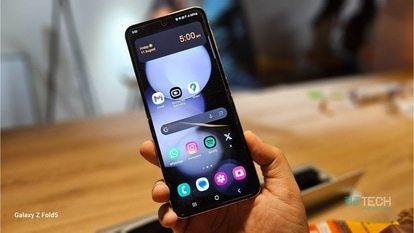If We Could Rent Apple iPhones, Would That Help Save the Planet?
Apple is working on an iPhone subscription service, and a German rental company just raised more than $330 million.

In 2015, German entrepreneur Michael Cassau was in need of some gadgets for an apartment he was planning to occupy for a few months. Buying seemed wasteful, considering the cost of new devices and the environmental impact associated with manufacturing new ones. But renting, an obvious option, simply wasn't available. So Cassau founded Grover Group GMBh, a gadget rental company based in Berlin. Seven years later, it's renting out 500,000 gadgets, mostly around Europe, and it just raised $330 million for a $1 billion valuation.
It's rare when what's good for the pocketbook is also good for the environment. Grover, along with other companies offering rental and subscription services, is hoping to achieve both. For now, the most likely outcome is that consumers will benefit, while the environmental outcomes are marginally better, at best.
But that's just the short term. Grover and other companies are betting on a long-term shift from ownership to hardware rental and subscriptions. If they're even remotely correct, the global technology industry will need to shift to accommodate them. In time, that shift will drive the development of greener devices and more sustainably minded companies.
Device rental isn't a new idea. In the 1980s, business productivity devices like photocopiers and fax machines were typically rented due to their high upfront costs (faxes started around $2,500) and the potential for expensive maintenance. It was only in the 1990s, as the cost of technology declined, that many business consumers opted for purchase. If a fax machine broke down, it could always be replaced with another $300 one.
That cheap technology was good for productivity and the bottom line of manufacturers and their customers. But cheap technology came with a new set of problems. As manufacturing costs declined, so too did the durability of devices. What's left behind are piles of unwanted gadgets that were designed to be upgraded, not repaired. That, in turn, creates pressure to manufacture more stuff.
According to Apple Inc., 81% of the carbon emissions associated with the full life cycle of the iPhone 13 are generated during the production process (which includes the extraction of raw materials). That's a hard number to lower: Production accounted for 83% of the carbon emissions associated with last year's iPhone 12, despite genuine advances in the use of recycled materials like rare-earth elements between the two most recent models.
The good news is that consumers have a simple means of lowering the carbon and other environmental stressors related to gadgetry: Use devices for longer. By delaying an upgrade just one year, a user displaces the production of a new device and its environmental impacts.
That displacement can add up. A recent European study examined the life span of every phone bought and used in the European Union over a decade. If the total life cycle of each of those phones was extended by one year (over the 21.6-month average at the time of the study), roughly 20 million tons of carbon would be saved.
Enter device rental services. “The sustainability impact for us is aligned with profitability,” explained Thomas Antonioli, Grover's CFO, in a call from Berlin a few days after announcing its latest fundraising round. “Because the longer we can keep a device in a rentable state, keep it in circulation, the better it is for us.”
The service is straightforward. A customer chooses the rental duration, and has the option along the way to purchase the device outright (around 10% do). Across the entire product line, the average rental duration is one year, and devices circulate for 3–4 years.
For phones, that's a life cycle far longer than the duration that most first owners hold onto phones. But in the age of the $1,000+ smartphone, it's the rare handset that only has a first owner. These days, secondhand phones are the fastest-growing niche of the global smartphone industry (and second owners are more common than first owners). So long as that secondhand option exists, it's unlikely that rental is playing a meaningful role in extending the life cycle of today's devices.
But that doesn't mean rental won't have an environmental impact.
Grover, like other rental services, isn't interested in short-lived devices that need expensive repairs. Instead it seeks out durable devices that will last longer without maintenance.
Grover's purchases alone won't suffice to shift technology companies from making devices designed for brief life spans. But it's far from alone in seeking those devices. By one estimate, device rental could be a $500 billion business by 2028. If that emerges, the market pressure to build durability for rentals will be overwhelming.
It won't just be startups pressuring manufacturers, either. Last month, Bloomberg reported that Apple Inc. is working on a subscription service for the iPhone and other hardware. It's rental by another name, with recurring payments and the option to upgrade.
If, as seems likely, Apple launches the business, it will have a powerful internal motivation to design durable devices that can be rented and sold multiple times. Other technology companies, keen to capture their own piece of the emerging rental business, will need to compete on a similar basis.
Of course, durability alone can't guarantee that technology becomes more sustainable. Consumers must still want their devices to last as long as possible. Thanks to rental, the very entities that design and sell their devices will be partners in their quest, rather than antagonists designing for obsolescence. For Grover and other emerging rental companies, that's an investment worth making.
Catch all the Latest Tech News, Mobile News, Laptop News, Gaming news, Wearables News , How To News, also keep up with us on Whatsapp channel,Twitter, Facebook, Google News, and Instagram. For our latest videos, subscribe to our YouTube channel.


























